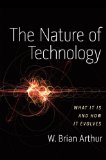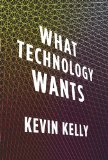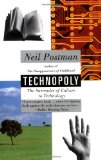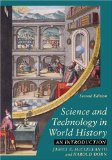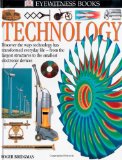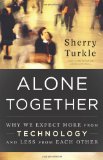Technology
The Nature of Technology: What It Is and How It Evolves
by W. Brian Arthur
Hardcover from Free Press
"More than any thing else technology creates our world. It creates our wealth, our economy, our very way of being," says W. Brian Arthur. Yet, until now the major questions of technology have gone unanswered. Where do new technologies come from -- how exactly does invention work? What constitutes innovation, and how is it achieved? Why are certain regions -- Cambridge, England, in the 1920s and Silicon Valley today -- hotbeds of innovation, while others languish? Does technology, like biological life, evolve? How do new industries, and the economy itself, emerge from technologies? In this groundbreaking work, pioneering technology thinker and economist W. Brian Arthur sets forth a boldly original way of thinking about technology that gives answers to these questions.The Nature of Technology is an elegant and powerful theory of technology's origins and evolution. It achieves for the progress of technology what Thomas Kuhn's The Structure of Scientific Revolutions did for scientific progress. Arthur explains how transformative new technologies arise and how innovation really works. Conventional thinking ascribes the invention of technologies to "thinking outside the box," or vaguely to genius or creativity, but Arthur shows that such explanations are inadequate. Rather, technologies are put together from pieces -- themselves technologies -- that already exist. Technologies therefore share common ancestries and combine, morph, and combine again to create further technologies. Technology evolves much as a coral reef builds itself from activities of small organisms -- it creates itself from itself; all technologies are descended from earlier technologies.
Drawing on a wealth of examples, from historical inventions to the high-tech wonders of today, and writing in wonder fully engaging and clear prose, Arthur takes us on a mind-opening journey that will change the way we think about technology and how it structures our lives.
What Technology Wants
by Kevin Kelly
Hardcover from Viking Adult
A refreshing view of technology as a living force in the world.
This provocative book introduces a brand-new view of technology. It suggests that technology as a whole is not a jumble of wires and metal but a living, evolving organism that has its own unconscious needs and tendencies. Kevin Kelly looks out through the eyes of this global technological system to discover "what it wants." He uses vivid examples from the past to trace technology's long course and then follows a dozen trajectories of technology into the near future to project where technology is headed. This new theory of technology offers three practical lessons: By listening to what technology wants we can better prepare ourselves and our children for the inevitable technologies to come. By adopting the principles of pro-action and engagement, we can steer technologies into their best roles. And by aligning ourselves with the long-term imperatives of this near-living system, we can capture its full gifts. Written in intelligent and accessible language, this is a fascinating, innovative, and optimistic look at how humanity and technology join to produce increasing opportunities in the world and how technology can give our lives greater meaning.
Technology, Student Activity Manual
[no image]
by R. Thomas Wright
Paperback from Goodheart-Willcox Co
ISBN: 1590707206
The latest edition of Technology will help students realize how technology affects people and the world in which we live. Numerous illustrations and easy-to-read text enable understanding of how people use technology and why technological systems work the way they do. Student-friendly features, such as Tomorrow s Technology Today, Technology Explained, Connections to Technology, and Career Corners, provide numerous practical examples of the impacts of technology on our world. This edition of the book has a broadened scope, with information on automation and robotics, digital photography, digital signals, and job skills and employment. The book is fully correlated to the Standards for Technological Literacy.
The Student Activity Manual combines the elements of a workbook and a laboratory manual. Activities may be pencil-and-paper, hands-on, or a combination of the two.
Technopoly: The Surrender of Culture to Technology
by Neil Postman
Paperback from Vintage
Media Published: 1993-
ISBN: 0679745408
In this witty, often terrifying work of cultural criticism, the author of Amusing Ourselves to Death chronicles our transformation into a Technopoly: a society that no longer merely uses technology as a support system but instead is shaped by it--with radical consequences for the meanings of politics, art, education, intelligence, and truth.Neil Postman is one of the most level-headed analysts of education, media, and technology, and in this book he spells out the increasing dependence upon technology, numerical quantification, and misappropriation of "Scientism" to all human affairs. No simple technophobe, Postman argues insightfully and writes with a stylistic flair, profound sense of humor, and love of language increasingly rare in our hastily scribbled e-mail-saturated world.
Science and Technology in World History: An Introduction
by James E. McClellan, Harold Dorn
Paperback from The Johns Hopkins University Press
ISBN: 0801883601
Now in its second edition, this bestselling textbook may be the single most influential study of the historical relationship between science and technology ever published. Tracing this relationship from the dawn of civilization through the twentieth century, James E. McClellan III and Harold Dorn argue that technology as "applied science" emerged relatively recently, as industry and governments began funding scientific research that would lead directly to new or improved technologies.
McClellan and Dorn identify two great scientific traditions: the useful sciences, patronized by the state from the dawn of civilization, and scientific theorizing, initiated by the ancient Greeks. They find that scientific traditions took root in China, India, and Central and South America, as well as in a series of Near Eastern empires, during late antiquity and the Middle Ages. From this comparative perspective, the authors explore the emergence of Europe and the United States as a scientific and technological power.
The new edition reorganizes its treatment of Greek science and significantly expands its coverage of industrial civilization and contemporary science and technology with new and revised chapters devoted to applied science, the sociology and economics of science, globalization, and the technological systems that underpin everyday life.
Eyewitness: Technology
by Roger Bridgman
Hardcover from DK CHILDREN
ISBN: 0789448874Discover the ways technology has transformed everyday life-from the largest structures to the smallest electronic devices.
Packed with superb color illustrations and fascinating facts, this highly informative guide explores all aspects of technology, from ancient artifacts to the latest advances in computer-aided design. Clearly annotated photographs and diagrams give an invaluable insight into the tools, machines, and systems that have shaped the modern world. See how the strength of different materials is measured, the structure of a suspension bridge, how keyhole surgery works, what astronauts eat in space, and how milk bottles have changed shape. Learn which materials pull and which ones push, how engines convert heat into work, how an airplane flies, how instant coffee is created, and how a ring-pull is made. Discover why glass is a liquid, the difference between inventors and designers, what a CD is made from -- and how a CD player works, how science can help protect threatened plant species, and much, much more.
Technology Matters: Questions to Live With
by David E. Nye
Paperback from The MIT Press
ISBN: 0262640678
Technology matters, writes David Nye, because it is inseparable from being human. We have used tools for more than 100,000 years, and their central purpose has not always been to provide necessities. People excel at using old tools to solve new problems and at inventing new tools for more elegant solutions to old tasks. Perhaps this is because we are intimate with devices and machines from an early age--as children, we play with technological toys: trucks, cars, stoves, telephones, model railroads, Playstations. Through these machines we imagine ourselves into a creative relationship with the world. As adults, we retain this technological playfulness with gadgets and appliances--Blackberries, cell phones, GPS navigation systems in our cars.We use technology to shape our world, yet we think little about the choices we are making. In Technology Matters, Nye tackles ten central questions about our relationship to technology, integrating a half-century of ideas about technology into ten cogent and concise chapters, with wide-ranging historical examples from many societies. He asks: Can we define technology? Does technology shape us, or do we shape it? Is technology inevitable or unpredictable? (Why do experts often fail to get it right?)? How do historians understand it? Are we using modern technology to create cultural uniformity, or diversity? To create abundance, or an ecological crisis? To destroy jobs or create new opportunities? Should "the market" choose our technologies? Do advanced technologies make us more secure, or escalate dangers? Does ubiquitous technology expand our mental horizons, or encapsulate us in artifice?These large questions may have no final answers yet, but we need to wrestle with them--to live them, so that we may, as Rilke puts it, "live along some distant day into the answers."
Alone Together: Why We Expect More from Technology and Less from Each Other
by Sherry Turkle
Hardcover from Basic Books
ISBN: 0465010210
Consider Facebook--it's human contact, only easier to engage with and easier to avoid. Developing technology promises closeness. Sometimes it delivers, but much of our modern life leaves us less connected with people and more connected to simulations of them.In Alone Together, MIT technology and society professor Sherry Turkle explores the power of our new tools and toys to dramatically alter our social lives. It's a nuanced exploration of what we are looking for--and sacrificing--in a world of electronic companions and social networking tools, and an argument that, despite the hand-waving of today's self-described prophets of the future, it will be the next generation who will chart the path between isolation and connectivity.
Search This Site
Science and Technology on DVD
|
|
Science and Technology |
Copyright © 1997-2026 dropbears.com



